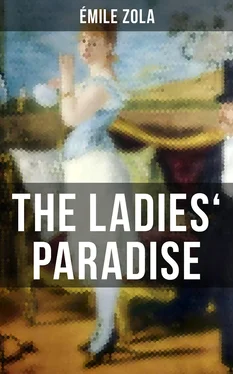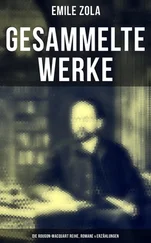Émile Zola
Published by

Books
- Advanced Digital Solutions & High-Quality eBook Formatting -
musaicumbooks@okpublishing.info
2017 OK Publishing
ISBN 978-80-272-1891-2
CHAPTER I
CHAPTER II
CHAPTER III
CHAPTER IV
CHAPTER V
CHAPTER VI
CHAPTER VII
CHAPTER VIII
CHAPTER IX
CHAPTER X
CHAPTER XI
CHAPTER XII
CHAPTER XIII
CHAPTER XIV
Table of Contents
Denise had walked from the Saint-Lazare railway station, where a Cherbourg train had landed her and her two brothers, after a night passed on the hard seat of a third-class carriage. She was leading Pépé by the hand, and Jean was following her, all three fatigued after the journey, frightened and lost in this vast Paris, their eyes on every street name, asking at every corner the way to the Rue de la Michodière, where their uncle Baudu lived. But on arriving in the Place Gaillon, the young girl stopped short, astonished.
“Oh! look there, Jean,” said she; and they stood still, nestling close to one another, all dressed in black, wearing the old mourning bought at their father’s death. She, rather puny for her twenty years, was carrying a small parcel; on the other side, her little brother, five years old, was clinging to her arm; while behind her, the big brother, a strapping youth of sixteen, was standing empty-handed.
“Well,” said she, after a pause, “that is a shop!”
They were at the corner of the Rue de la Michodière and the Rue Neuve-Saint-Augustin, in front of a draper’s shop, which displayed a wealth of color in the soft October light. Eight o’clock was striking at the church of Saint-Roch; not many people were about, only a few clerks on their way to business, and housewives doing their morning shopping. Before the door, two shopmen, mounted on a step-ladder, were hanging up some woollen goods, whilst in a window in the Rue Neuve-Saint-Augustin another young man, kneeling with his back to the pavement, was delicately plaiting a piece of blue silk. In the shop, where there were as yet no customers, there was a buzz as of a swarm of bees at work.
“By Jove!” said Jean, “this beats Valognes. Yours wasn’t such a fine shop.”
Denise shook her head. She had spent two years there, at Cornaille’s, the principal draper’s in the town, and this shop, encountered so suddenly—this, to her, enormous place, made her heart swell, and kept her excited, interested, and oblivious of everything else. The high plate-glass door, facing the Place Gaillon, reached the first storey, amidst a complication of ornaments covered with gilding. Two allegorical figures, representing two laughing, bare-breasted women, unrolled the scroll bearing the sign, “The Ladies’ Paradise.” The establishment extended along the Rue de la Michodière and the Rue Neuve-Saint-Augustin, and comprised, beside the corner house, four others—two on the right and two on the left, bought and fitted up recently. It seemed to her an endless extension, with its display on the ground floor, and the plate-glass windows, through which could be seen the whole length of the counters. Upstairs a young lady, dressed all in silk, was sharpening a pencil, while two others, beside her, were unfolding some velvet mantles.
“The Ladies’ Paradise,” read Jean, with the tender laugh of a handsome youth who had already had an adventure with a woman. “That must draw the customers—eh?”
But Denise was absorbed by the display at the principal entrance. There she saw, in the open street, on the very pavement, a mountain of cheap goods—bargains, placed there to tempt the passers-by, and attract attention. Hanging from above were pieces of woollen and cloth goods, merinoes, cheviots, and tweeds, floating like flags; the neutral, slate, navy-blue, and olive-green tints being relieved by the large white price-tickets. Close by, round the doorway, were hanging strips of fur, narrow bands for dress trimmings, fine Siberian squirrel-skin, spotless snowy swansdown, rabbit-skin imitation ermine and imitation sable. Below, on shelves and on tables, amidst a pile of remnants, appeared an immense quantity of hosiery almost given away knitted woollen gloves, neckerchiefs, women’s hoods, waistcoats, a winter show in all colors, striped, dyed, and variegated, with here and there a flaming patch of red. Denise saw some tartan at nine sous, some strips of American vison at a franc, and some mittens at five sous. There appeared to be an immense clearance sale going on; the establishment seemed bursting with goods, blocking up the pavement with the surplus.
Uncle Baudu was forgotten. Pépé himself, clinging tightly to his sister’s hand, opened his big eyes in wonder. A vehicle coming up, forced them to quit the road-way, and they turned up the Rue Neuve-Saint-Augustin mechanically, following the shop windows and stopping at each fresh display. At first they were captivated by a complicated arrangement: above, a number of umbrellas, laid obliquely, seemed to form a rustic roof; beneath these a quantity of silk stockings, hung on rods, showed the roundness of the calves, some covered with rosebuds, others of all colors, black open-worked, red with embroidered corners, and flesh color, the silky grain of which made them look as soft as a fair woman’s skin; and at the bottom of all, a symmetrical array of gloves, with their taper fingers and narrow palms, and that rigid virgin grace which characterizes such feminine articles before they are worn. But the last window especially attracted their attention. It was an exhibition of silks, satins, and velvets, arranged so as to produce, by a skilful artistic arrangement of colors, the most delicious shades imaginable. At the top were the velvets, from a deep black to a milky white: lower down, the satins—pink, blue, fading away into shades of a wondrous delicacy; still lower down were the silks, of all the colors of the rainbow, pieces set up in the form of shells, others folded as if round a pretty figure, arranged in a life-like natural manner by the clever fingers of the window dressers. Between each motive, between each colored phrase of the display ran a discreet accompaniment, a slight puffy ring of cream-colored silk. At each end were piled up enormous bales of the silk of which the house had made a specialty, the “Paris Paradise” and the “Golden Grain,” two exceptional articles destined to work a revolution in that branch of commerce.
“Oh, that silk at five francs twelve sous!” murmured Denise, astonished at the “Paris Paradise.”
Jean began to get tired. He stopped a passer-by. “Which is the Rue de la Michodière, please, sir?”
On hearing that it was the first on the right they all turned back, making the tour of the establishment. But just as she was entering the street, Denise was attracted by a window in which ladies’ dresses were displayed. At Cornaille’s that was her department, but she had never seen anything like this, and remained rooted to the spot with admiration. At the back a large sash of Bruges lace, of considerable value, was spread out like an altar-veil, with its two white wings extended; there were flounces of Alençon point, grouped in garlands; then from the top to the bottom fluttered, like a fall of snow, a cloud of lace of every description—Malines, Honiton, Valenciennes, Brussels, and Venetian-point. On each side the heavy columns were draped with cloth, making the background appear still more distant. And the dresses were in this sort of chapel raised to the worship of woman’s beauty and grace. Occupying the centre was a magnificent article, a velvet mantle, trimmed with silver fox; on one side a silk cape lined with miniver, on the other a cloth cloak edged with cocks’ plumes; and last of all, opera cloaks in white cashmere and white silk trimmed with swansdown or chenille. There was something for all tastes, from the opera cloaks at twenty-nine francs to the velvet mantle marked up at eighteen hundred. The well-rounded neck and graceful figures of the dummies exaggerated the slimness of the waist, the absent head being replaced by a large price-ticket pinned on the neck; whilst the mirrors, cleverly arranged on each side of the window, reflected and multiplied the forms without end, peopling the street with these beautiful women for sale, each bearing a price in big figures in the place of a head.
Читать дальше













